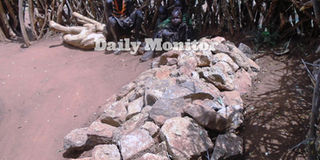When the dead are feared

Children and their mother sit beside a grave as they mourn the death of their grandmother in Kaabong District last week. Photo by Steven Ariong
What you need to know:
Culture. Death is a dreaded occurrence in all cultures but ages ago the Karimojong took their fear of death a notch further by abandoning bodies for fear that their spirit would claim another family member.
African societies have elaborate burial rituals and beliefs about death, although today many have faded away. Among the Karimojong for instance, touching the dead was regarded taboo. It was not uncommon for relatives to abandon dead bodies. Although this custom is slowly fading, recently, Moroto Regional Referral Hospital was in the media after relatives abandoned their dead in the mortuary.
“When a person died, especially a youth or a child, everybody would run away from the body especially if he died inside the house, the whole kraal or Manyatta (homestead) would be forced to migrate to another place because they believed that their spirit would call for another person to follow the dead,” says Zackary Lokol, one of the elders and resident of Nabilatuk Sub-county in Nakapiripirit District. The pastoralist nature of the Karimojong made it easy for the family to start a new life in a different location.
According to Joseph Lomokol, another elder, after three months, the clan that had lost the person would slaughter a sheep and the mutton would be shared by everyone in that village.
“The motive of slaughtering the sheep and serving everyone was to prove whether the deceased had died a natural death. If he had died as a result of witchcraft those involved in killing that person would die if they ate the mutton,” he says.
According to Lokol, the fear of dead bodies can be traced to colonial times when residents reported suspicious activity at graveyards. Today, although this custom is not largely practiced due to modernity, Lokol reveals there is still a certain degree of suspicion that surrounds dead bodies.
“While now dead bodies are buried by most families, it is done as soon as possible fear of being possessed by the spirit of the dead,” he says.
Betty Nachap, an elder, says it was believed that the spirits of children are more dangerous and as such nobody wanted to associate with the body, even the mother herself.
“Today more respect is accorded to the dead because the younger generations are more enlightened,” she says.
In regard to burial ceremonies, according an elder Samson Lokol, usually after the burial, especially for the elderly persons, community members from that village and clan would participate in what they called akibilar ekitoi, meaning to break away a tree. A big bull would be speared for the peaceful sendoff of the spirits of the deceased because he would have died at the old age.
Lokol also added that the heads of the family members who have lost a person would be shaved, leaving one straight line of hair in the middle.
At the burial, it depends who has died if the dead person is affluent, they always conduct prayers, cook food, but if it’s not a prominent person nobody bothers. In most cases they can even throw away the body in any bush or river.
sheep ritual
According to Joseph Lomokol, another elder, after three months, the clan that had lost the person would slaughter a sheep and the mutton would be shared by everyone in that village. “The motive of slaughtering the sheep and serving everyone was to prove whether the deceased had died a natural death. If he had died as a result of witchcraft those involved in killing that person would die if they ate the mutton,” he says.




